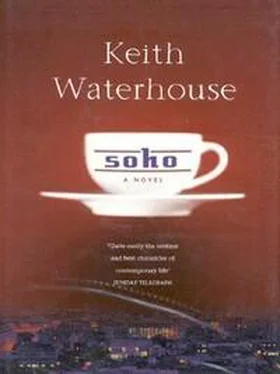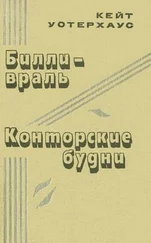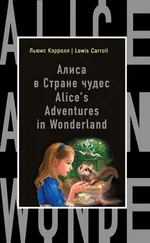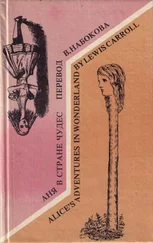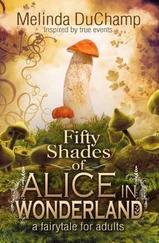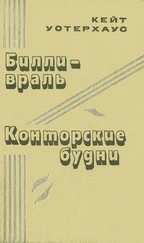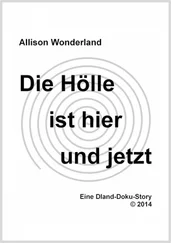“What’s this book of yours called again?” asked James, looking the picture of innocence as he tapped Alex on the ankle, at the same time winking at the detective inspector, a practice they seemed to go in for with their peculiar sense of humour.
“ Freeze When You Say That , why?”
“It’s just that I thought I heard Ellis Hugo Bell mention a novel of that title.”
“Can’t have done, I’ve never even mentioned it to him after the sod pissed me about over the last one. And then, as we now know, nicked the plot.”
“He could have read it by now, though, couldn’t he?” said Detective Inspector Wills seriously, joining in James’s legpull.
Wild-eyed again, Grizzard stared in turn at the detective, at the reporter, and at the visiting Yorkshireman. He then bounded to his feet, gulped down the remainder of Alex’s wine, and leaped up the stairs, accompanied by appropriate silent cinema music from the shit-hot jazz pianist in the spade hat who, with Grizzard’s exit safely effected, reverted to the Scott Joplin number he had been strumming.
Alex, more out of nervousness than appreciation of the music, began compulsively tapping his foot, although on the offbeat, knowing nothing about jazz except that he knew what he liked, and it wasn’t that fookin modern stuff.
He was also, to a completely different beat, drumming a hand on the table while jerking his head in and out like an agitated terrapin. An embarrassed James Flood, avoiding the musician’s amused eye across the room, said: “If you like jazz, Alex, why don’t we go down the Blue Note?”
“What, at this blurry hour? Will they still be open?”
“They won’t even have started yet,” said Detective Inspector Wills. “They go down there to jam among themselves, after doing a few sets at Ronnie Scott’s and wherever.”
Suited Alex. The longer he fought off sleep the less of a problem it was going to be to find somewhere to lay down his head for what remained of the night. Someone had told him there was a twenty-four-hour McDonald’s in Leicester Square, wherever that might be. Must be near that tube station of the same name that he’d got out at after he’d been dropped at King’s Cross by Dave, seemed weeks ago now. Black coffee, McMuffin, and a few sly zeds before dawn broke or he got chucked out, whichever came the sooner. Then sod it, sod Selby, sod the lorrer them, he was off. Get back somehow, he’d think about it in the morning.
“You coming down, Benny?” asked James ingratiatingly, the reporter sucking up to the law.
“Nah,” the policeman said. “I was in last night. I want to look in at that new lesbo club in Rupert Street.”
“Thought it had been closed down for having no licence?”
“It has. I want to check if it’s still open. Might see you for a nightcap afterwards, down the Waiters Club.”
Nightcap? Fookin hell. Didn’t these people have homes to go to?
“All right, Benny, seeya layer.”
“Seeya layer.”
As Alex rose, echoing, “Seeya layer,” in a worldly way, he saw Jenny Wise threading her way through the room, clutching, as if he were a fairground prize, the hand of a young, handsome and currently rather sheepish-looking actor he recognised from one of the soaps.
As they climbed the stairs, the shit-hot jazz pianist in the spade hat played Jenny a little exit music. “Tomorrow”, from the musical Annie .
Now Alex understood why he’d been played off with the Beatles’ “Yesterday” when he detached himself from Jenny after her brush-off at the bar.
So this Barry Chilton was a poet, was he, so what? Alex had met poets before, in fact Leeds was overrun with the buggers. Pub he used to go to, the Frog and Firkin, used to have Monday night poetry readings before they changed the policy and turned it into a Quiz Nite. The poems were mainly by students like himself and he didn’t much reckon them, they were like the ones you used to write at school, wind blowing, leaves swirling, all that kinder shite. He supposed this bugger’s would be the same.
Say this for him, though. First time he’d ever known a poet buy a blurry drink. Probably just sucking up to James Flood, wanted to get his name in the Examiner .
And this was the famous Blue Note, was it? The usual crummy basement. If the Thames came up from wherever it was and So-oh got fookin flooded, the whole district would go bankrupt. Or their insurance companies would; but moster them didn’t look insured to Alex, admittedly no expert in these matters. Coupler dozen punters mebbe, sitting at what looked like old kitchen tables, with candles stuck in wine bottles providing the only illumination. Sprinkling of black guys, they looked like proper jazz buffs. Strong smell of spliffs, Alex wondered what Detective Inspector Wills had made of it when he was in last night. Usual catpiss wine. Over there sat Jenny Wise with that young bloke from the TV soap. Alex wondered if he’d scored yet. Or, perhaps more to the point, if she had.
The set had not yet begun. The saxophonist and the clarinet player, both of them ageing with grey sixties sideboards, unpacked their instruments and began tuning up. While the generous Barry Chilton bought a bottle of wine at the serving hatch that doubled as cloakroom and box office, Alex mused on events since leaving Gerry’s Club.
It had continued to be a curious evening. Curious morning rather, by this time. Falling out of Gerry’s Club Alex was surprised to find Dean Street, at three a.m., as lively, livelier in fact, as it had been twelve hours ago. Few places were open now — itinerant hot-dog sellers, their aluminium carts portable and powerful stench-carriers, had moved in to fill the market gap created by the closed cafés and restaurants. What the punters were doing now was promenading, sauntering about and breathing in the warm air, fresh after the summer rain. Either that or waiting for the taxis that never came. There were touts on the street: mini-cab touts, drug touts, near-beer club touts, hotel touts, pimps, as James knowledgeably identified them. It was a working street still: everybody had an angle.
They turned into Old Compton Street, to the corner where he’d started his long Soho odyssey so many hours, or was it days, ago. The scene was much the same as earlier, except that the shops and bars were closed and most of their doorways were occupied by the blanket-shrouded homeless. From the kitchens of the closed-down restaurants, ruffianly looking commis chefs and washers-up were emerging blinking into the half-dawn, like rats ascending from the sewers, before hurrying off, so James said, to lose their night’s earnings in the Chinese gambling clubs around Gerrard Street. A beggar asked for change. Following James’s lead, Alex ignored him. Giving handouts was not cool.
As they passed the narrow entry to Compton’s Yard, the home of Kemble’s Club, they heard a familiar sing-song voice: “… And in this humble little alley, ladies and gentlemen, was situated, until he was embraced by fame, the engraving shop of William Hogarth, renowned for his portrayals of London life such as The Rake’s Progress . This very yard, it has been suggested, may have been the inspiration for his Gin Alley …”
“His late late show,” explained James. “They come in on the long-haul red-eye, sleep all the way over then can’t sleep when they get here. He rounds them up in the hotel lobbies.”
Alex abruptly interrupted this dissertation: “Can you smell burning?”
“Chip-pan fire,” said James Flood, sniffing the air.
“Bollox. Nobody’s cooking chips at this timer night, not even in So-oh.”
Led by a tired-looking Len Gates, who was now delivering an on-the-hoof droning monologue about how Soho had once been the main centre for tapestry manufacture in the capital, and how Hogarth had taken one Joshua Morris, a craftsman, to the Court of Common Pleas for failing to pay for a tapestry he had commissioned, a crocodile of bleary-eyed Californians was shuffling out into Old Compton Street. In contra-flow to them, Alex and James drifted down into Compton’s Yard and yes, there was definitely a smell of burning.
Читать дальше
